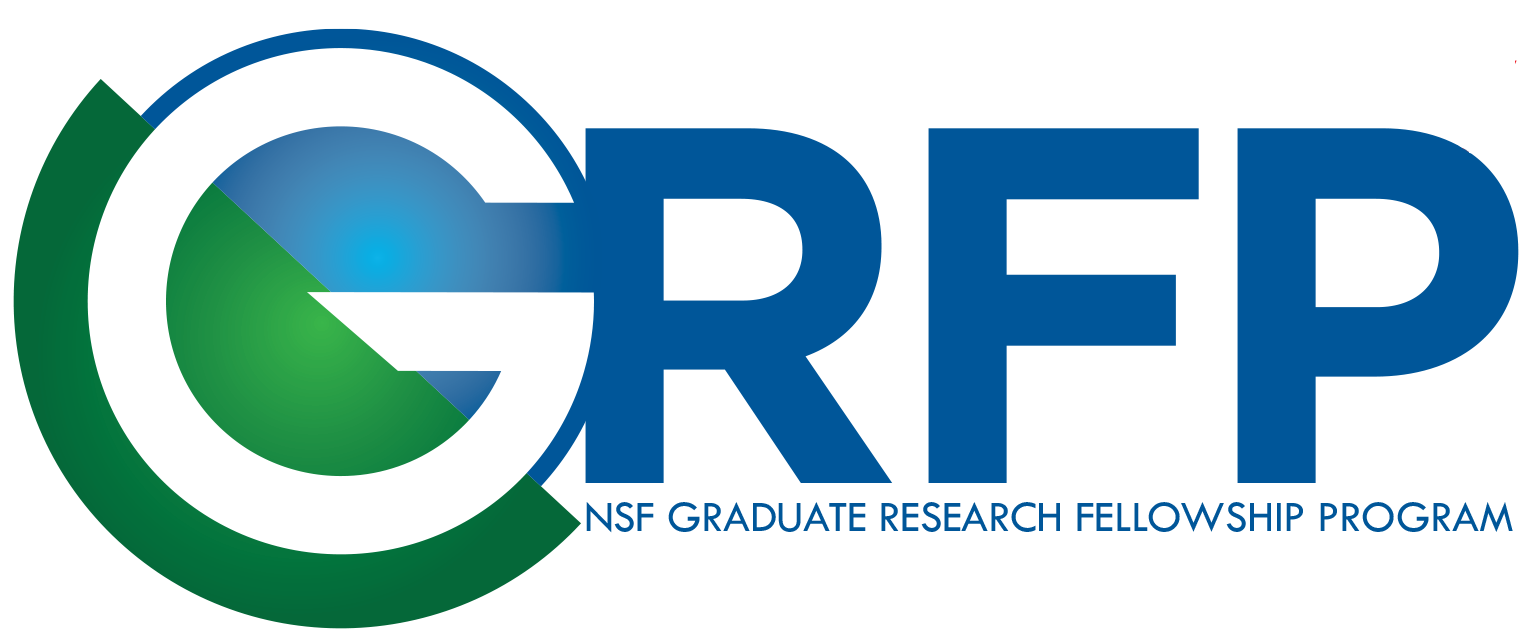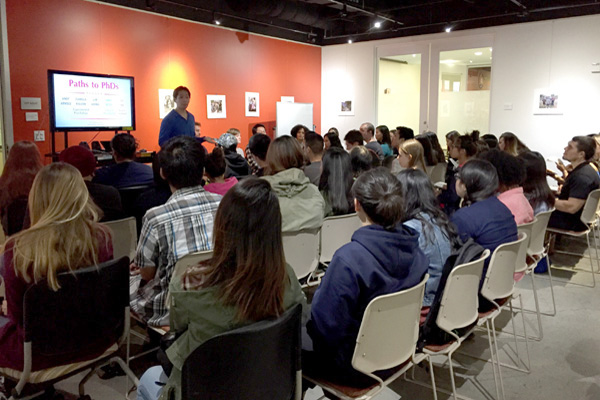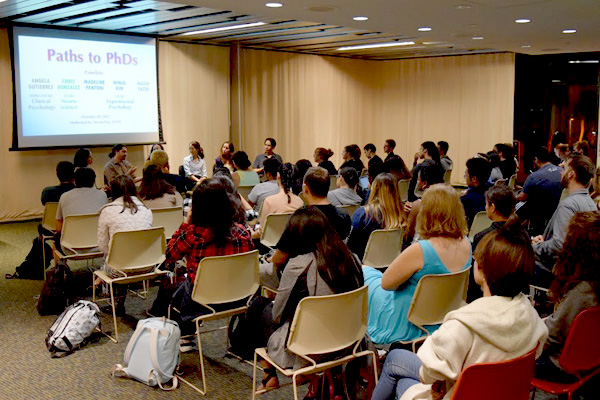Resources
Paths to PhDs
Helping diverse students learn about graduate opportunities in psychology, neuroscience, and related fields
Graduate school should not be just for the privileged few. If one is interested in pursuing a research career, is academically inclined, and willing to work hard, then a graduate education should be within reach. However, far too many undergraduates -- particularly those from minority backgrounds and those who are the first in the families to go to college -- are unaware of higher education opportunities, or find it hard to see themselves attaining a graduate degree. To address this issue, I organized the Paths to PhDs panel workshop series which occurred at UCSD since 2016 (and, after training new graduate members of the Psychology Department to continue the event, has continued since). At each event, 70-150+ undergraduates join a panel of five or six graduate students from different areas of psychology/neuroscience research to discuss topics such as:
- Why did you decide to go to graduate school?
- Did your family support your decision to go to graduate school?
- Is your chosen profession in alignment with the expectations of your cultural background?
- Did you have research experience, and what kind of experience was that?
- Did you take a break between undergrad and grad school? How did you manage finances at that time?
- How did you pick which programs to apply for?
- How did you prepare for the Graduate Record Examination (GRE) or other required tests?
- What was the interview experience like?
- ...and many more considerations.
Paths to PhDs is generously sponsored by the Cross Cultural Center, which itself is supported by the Office for Equity, Diversity, and Inclusion. Each event, which typically takes place in Price Center, is announced in the campus Student Events Insider, in student organization newsletters, as at nearby universities (e.g., SDSU, USD, CSUSM).
Here are some testimonials from past attendees:
- “I liked the honesty the panelists expressed about their process to get to grad school, it was reassuring to hear how not all of them went directly after college to a graduate program. It was definitely scary to hear the level of difficulty to be admitted to a graduate program and the experience needed, but it was something that it definitely worth knowing, so it was very much appreciated.”
- “I really appreciated the discussion about what would make our applications better or give us more experience for graduate school, both of which helped a lot.”
- “What I liked most about the panel was the variety of fields represented and that the panelists were very willing to answer questions honestly.”
Here are some other useful resources and links for potential PhD students:
https://psychology.ucsd.edu/graduate-program/prospective-students/admissions.html
https://apply.grad.ucsd.edu/departments/neurosciences
http://voyteklab.com/removing-barriers-to-science/
Note: the above links are to official academic webpages or faculty-created resources. Links to third-party services or organizations are not posted (and to such organizations, please do not contact this website requesting that such links be added; this site does not accept advertising requests).
Fellowship Application Tips
Applying for the National Science Foundation Graduate Research Fellowship

I strongly encourage my students, anyone who is applying to graduate school, and first year graduate students to consider applying for the National Science Foundation Graduate Research Fellowship Program (NSF-GRF). Not only is the “NSF” a prestigious grant to receive, but it confers increased research and educational autonomy, extra financial resources, networking opportunities, and more. Applying for the fellowship can however seem like a daunting process. Here are some of my suggestions on how to successfully apply.
First, it is very important to carefully research the NSF-GRF program requirements to determine (a) eligibility and (b) application requirements. Please note that some second-hand information that is available online, which refers to three application essays, is outdated (albeit often still useful with regards to content and general advice); the National Science Foundation has since combined the Previous Experience and Personal Statement essays into one longer essay, making the task is generally easier (write only two essays).
Second, after carefully researching the particulars of the program and application process, nearly my entire focus was on writing the (a) Personal Statement and (b) Research Proposal. The key thing was to write and revise early--and to ask as many qualified people as possible to read and provide suggestions. These included professors, colleagues, and friends. I got many, many suggestions, and incorporated them as desired using my judgment. It was utterly critical to make sure that both essays addressed the (a) Intellectual Merit and (b) Broader Impacts criterion. It should be noted that some professors in one’s field may provide editing suggestions that are too specific (reviewers will likely not be close experts of your chosen topic or subfield).
Broadly, I focused on creating a coherent narrative, highlighting both Intellectual Merit and Broader Impacts throughout both essays. In the Personal Statement, I described my research and teaching interests and activities, progressing from undergraduate experiences to my graduate-level research plans and activities. In the Research Proposal, I highlighted how my intended research project would make a contribution to my field / subdiscipline as well as have tangible societal impacts and benefits. Both essays were carefully and heavily revised to be as clear and to the point as possible.
Ultimately, the success of one’s application depends on luck of the draw (the reviewers one gets, the state of the competitive slate that year, the reception your research topic gets, etc.). That part is out of one's hands. However, one can always put one's best foot forward. Also, one is grouped by level of review (pre-grad, 1st year, and 2nd year if eligible). So each applicant will not be competing against people who are at different stages of their graduate training. To all applicants, I wish you the best of luck!
Note: The above recommendations are solely my own as a NSF Fellow and Resource Person. Any opinions, findings, and conclusions or recommendations expressed in this material are those of the author and do not necessarily reflect the views of the National Science Foundation.
Applying for the UC President's / Chancellor's Postdoctoral Fellowship

I have had the fortune of being supported by a University of California President's Postdoctoral Fellowship / Chancellor's Postdoctoral Fellowship (PPFP / CPFP), for which I am very grateful. The PPFP supports postdoctoral fellows at any one of the ten University of California (UC) campuses. The PPFP is remarkable: In addition to supporting one's postdoctoral research, it offers fantastic opportunities for career development, networking, and mentoring. The PPFP is designed for postdoctoral fellows that have an interest in pursuing academic research careers and can contribute to the diversity of the UC via their research, teaching, and/or service. Its application is shared with the CPFP (which is essentially identical to the PPFP, except that support comes directly from a specified UC campus rather than the UC system), and it is akin to programs at the University of Michigan, University of Colorado, University of Maryland, Carnegie Mellon University, University of Minnesota, and University of North Carolina at Charlotte. Among the biggest strengths of the PPFP are the people that are involved in it: from the program leadership, to its faculty and administrative supporters, and of course the fellows, the PPFP is full of remarkably talented, unique, and fascinating individuals. Overall, the PPFP is a jewel of the UC system.
The PPFP application is somewhat reminscent of other postdoctoral applications, although less intensive than, for example, the Ruth L. Kirschstein National Research Service Award (NRSA, F32) Fellowship or the National Institute for Health Pathway to Independence (K99) Award. As of this writing, applying for the fellowship involves providing a (1) Thesis Abstract, a (2) Research Proposal, a (3) Education and Background Statement, (4) CV, and (5) a Writing Sample. Further, one needs to identify a faculty sponsor at a UC institution that would be the mentor during the course of the fellowship. There is also an application form that needs to be filled out, containing basic information (e.g., degree status, defense date, etc.), and recommendation letters are required.
My strongest piece of advice for the PPFP (and really any other form of competitive fellowship) is to plan ahead and start early. Given sufficient time, a suitable prospective mentor can be identified and essay drafts can be planned out, written, and revised with the benefit of feedback. The PPFP mentor should be a UC tenure-track faculty member. In my case, having completed my doctoral degree at UCSD, it was important to find a mentor at another UC campus (the PPFP strongly encourages applicants to propose conducting their fellowship at a location that is different from their graduate institution; for those applying from outside the UC system, they fulfill that recommendation by default). Finding a prospective mentor involves identifying compatible research interests, a potentially suitable mentoring style, a research laboratory and department that has the capacity to be a fruitful setting for a successful postdoctoral experience, and so on. In those respects it is not too dissimilar from the process of selecting a research lab and a faculty mentor for graduate school.
With respect to application components, some can often be addressed relatively quickly. The Thesis Abstract is simply taken from one's dissertation. The CV is simply one's latest CV. The Writing Sample is simply an empirical research paper (please note that I am writing this advice from the perspective of a learning scientist that engages primarily in empirical research; for others in different fields, such as the humanities, that sample might take a different form, such as a book excerpt). All of those items are uploaded directly to the application portal as PDFs. Recommendation letter links are also to be sent out from that portal. With respect to recommenders, suitable choices may be one's graduate advisor or members of one's dissertation committee. Importantly, although completing these items may simply involve a quick upload or sending a link, they may still take some time to prepare. As such, to avoid having to gather materials in a rush (and in particular, to allow for the need to track down recommenders, especially during the summer), it helps to allow for some extra time.
The Research Proposal and Education and Background Statement require substantially more time and effort. In my approach, the Research Proposal is a plan for what one intends to do during the fellowship. Given length limitations, however (700-1,000 words), there is not enough space for a lengthy proposal in the form of an NIH postdoctoral application; however, there is still room to provide concrete details and a coherent plan. Further, the Education and Background Statement (500-700 words), by my understanding, can resemble a biosketch of sorts, including a discussion of one's graduate career and what informs one's pursuit of a given research direction or directions. Ultimately, having given formal and informal advice to fellowship and award applicants over the years, my sense is that these types of essays are highly individualized and personal. Only the applicant can write essays suitable for their intended research direction and biography, and not others. It is important to be authentic; that is, true to oneself (honesty shines through). Accordingly, similar to advice I often give for various fellowships, I recommend starting first with a blank sheet of paper, working on one's own to create a draft or drafts, and then soliciting feedback from trusted advisors and colleagues before revising accordingly.
As a final point, it should be noted that I have not been privy to any inside secrets regarding how fellowship applications are evaluated, nor been an active participant in the evaluation process. Thus, my suggestions reflect what seemed to work in a given case, although the circumstances remain opaque. However, I believe that just working on one such application can be a useful experience that helps inform future application efforts. Best wishes for your applications!
Note: These suggestions represent my personal opinion on how to apply for the aforementioned types of postdoctoral fellowships. Any opinions, findings, and conclusions or recommendations expressed in this material are those of the author and do not necessarily reflect the views of the UC, the PPFP, CPFP, or any specific UC institution.
Here are some other useful resources to help you out:
http://grfpessayinsights.missouri.edu/index.php
http://www.pgbovine.net/fellowship-tips.htm
http://chronicle.com/article/How-to-Win-a-Graduate/46782
http://www.alexhunterlang.com/nsf-fellowship
http://rachelcsmith.com/academics/nsf.htm
https://smhs.gwu.edu/diversity/research/research-workforce/postdoctoral-research/
https://drugmonkey.scientopia.org/2014/05/30/your-grant-in-review-the-f32-postdoctoral-fellowship-application/
https://www.jordandward.com/k99-grant-writing.html
https://www.niaid.nih.gov/grants-contracts/sample-applications
Note: the above links are to academic personal webpages, faculty-created resources, or academic press outlets. Links to third-party services or organizations are not posted (and to such organizations, please do not contact this website requesting that such links be added; this site does not accept advertising requests).




